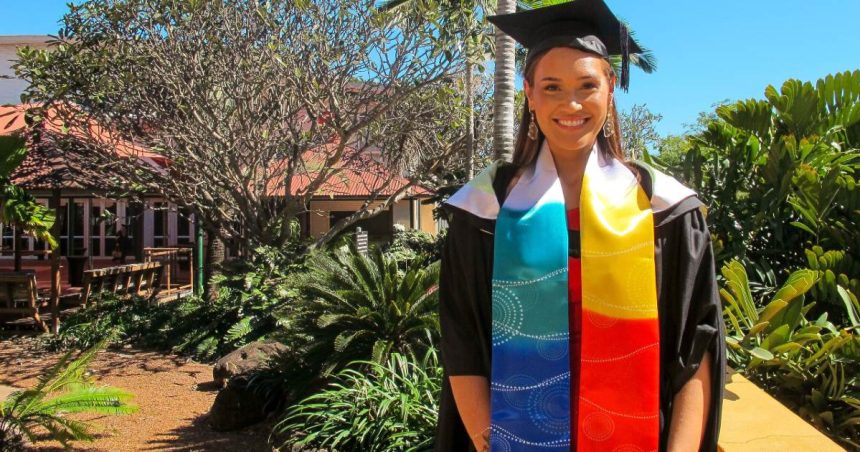When Teegan Wattam joins hundreds of fellow graduating students at the Casuarina campus of Charles Darwin University this week, she will be carving out her unique place in the institution’s history.
It will be the first time a First Nations graduate has received Bachelor of Health Science/Master of Speech and Language Therapy at Charles Darwin University (CDU).
Ms Wattam is a proud Larrakia and Wadjigan woman who has her sights set on addressing healthcare challenges in the Northern Territory – driven by a goal to help Territorians with speech and swallowing difficulties communicate and manage their conditions more effectively.
“I think there’s such a shortage of allied health professionals up here, and because of that there are long wait lists, which is probably the biggest impact as well, that we have a really high turnover of staff,” she says.
“I think people don’t realise the wider impact that allied health professionals have in the areas we can work in. Like, for example, a lot of people just think speech pathologists help people to talk.
“But we do a lot more than that. We help them with swallowing, to communicate in all different ways and in learning.”
Ms Wattam started her healthcare education at a university in Sydney, but when CDU opened places for a double degree in health science and speech pathology, she jumped at the chance to return home and be part of the first cohort of the course.
“I chose to study at CDU because it’s close to home. I’m a Territory girl born and raised,” Ms Wattam says.
“The biggest factor for me growing up was that there weren’t always the opportunities to study here. And most often than not, you had to leave home to access those opportunities. So having CDU open up this course, and being in the first cohort to graduate, was a really big thing for me.”
Ms Wattam captained the first CDU team to go to the Indigenous Nationals games, mentored in the Bidjipidji schools program and was in the NT Health Aboriginal Cadetship Program – all while being an attentive aunty to three nephews, who are the reason she is dedicated to her education.
“When I am working with young kids, I always think of my nephews because I know I would do anything to help them through life. They’re my reason why I keep studying, to show them the opportunities in education and the impact you can have in people’s lives.”
She hopes to use her qualification to improve healthcare accessibility throughout the NT, and looks forward to sharing her specialist knowledge, skills, and culture to make an impact in the community that shaped her.
“I really just want to get out in the community and give back to my mob and help young children have access to all these opportunities,” she says.
“Seeing these little kids achieve so much and the positive impact for them and their families is so rewarding. When parents have told me that they’re noticing the changes, it really means so much to me, because I believe in what their kids can do.”






